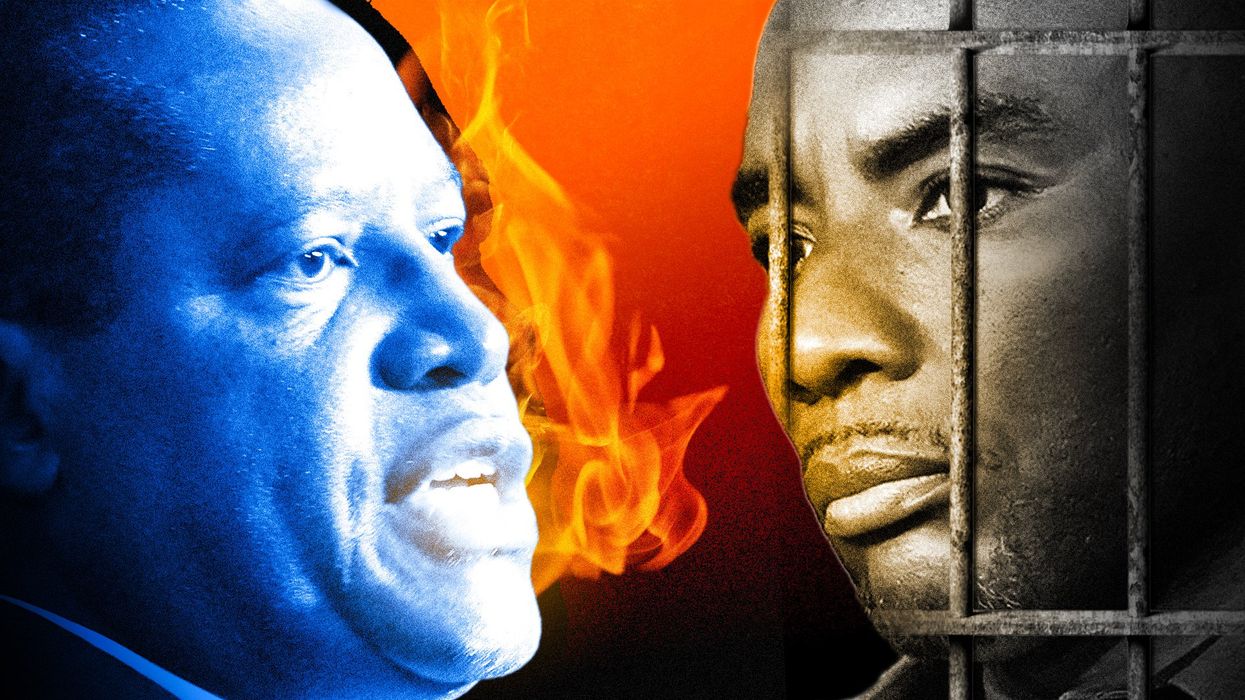
Bravo / Contributor, Scott Olson / Staff | Getty Images

If Larry Elder’s recent interview on "The Breakfast Club" podcast were a campaign ad, the title would practically write itself: “Never bring talking points to a fact fight.”
For more than an hour, the veteran radio host and 2024 presidential candidate used data and logic to pick apart every argument Charlamagne, DJ Envy, and political commentator Tezlyn Figaro had to offer about the state of black America.
The interview started with Elder discussing fatherlessness, something he described as the top social problem in America today. He noted that non-marital births have increased threefold for both blacks and whites since the 1960s and linked the breakdown of the nuclear family to violent crime, poverty, and incarceration.
You would think that after hearing something like that, a man who talks so much about race and helping “his people” would want to know what he and other influential African-Americans can do to change this reality. Instead, the host responded by asking Elder, “What do white people do wrong?”
In that moment, Charlamagne went from being a noted expert on systemic racism and social justice to a staunch supporter of the White Lives Matter movement. Like many black progressives, the author and radio host loves to talk about race when it comes to police brutality, “mass incarceration,” redlining, school funding inequities, or acts of violence tied to white supremacy. But as soon as the conversation turns to the roles black people must play in our own uplift, suddenly his throat starts to close, his skin starts to itch, and the only color he can see is white.
This allergic reaction to accountability can flare up at a moment’s notice. The only thing that brings a person suffering from severe symptoms out of anaphylactic shock is a jab of the “what about white people?” EpiPen. The urgent concern for white people magically disappears as the other symptoms subside and the patient is able to resume predictable conversations about systemic racism.
No family, community, or country can improve its social and economic condition as long as its members see themselves as helpless and powerless.
Elder’s exchanges with Tezlyn Figaro captured this dynamic perfectly. Earlier in the interview, she pressed him to acknowledge that President Lyndon Johnson was white. Why? She wanted him to acknowledge that political systems black people didn’t control 60 years ago created many of the problems African-Americans face today.
Later in the interview, Elder brought up the racial makeup of Baltimore’s leadership class in 2015 when the death of Freddie Gray sparked two weeks of protests and rioting. He noted that the mayor, police commissioner, state’s attorney, school superintendent, a majority of the city council, U.S. Attorney General Eric Holder, and President Obama were all black. Figaro interrupted him several times and stated that those officials had “positions'' but were “still not in charge of the system.”
According to "The Breakfast Club’s" chief political pundit, white executives, legislators, and bureaucrats have power, while black people in the same positions simply have jobs. Some people still believe the white man's ice is colder — even in city hall. If that’s the case, why should any black voters care about electing a mayor, governor, or congressman who looks like them? It makes no sense to vote for a candidate who doesn’t actually have the ability to enact systemic change.
Larry Elder’s interview on "The Breakfast Club" demonstrated why black conservatives must engage and make their voices heard in the public square.
Charlamagne stated he has no political affiliation, but it’s clear that he is used to interviewing people who share his progressive politics and worldview. He would never tell a single woman who can’t find a husband — or a lesbian who doesn't want one — that using a sperm donor to create an intentionally fatherless child is a selfish decision. Likewise, there is no need to define “mass incarceration” in a conversation with the co-founders of Black Lives Matter. And you know that a man who sounds like a Planned Parenthood spokesman isn’t worried about answering questions related to the inherent value of human life when he is interviewing Kamala Harris.
Politics is a contact sport, so ideas and positions that are never tested get brittle over time. The mind starts to atrophy when you spend most of your time with people who nod approvingly whenever they hear their favorite political catchphrase.
Black voters, like all Americans, deserve insightful debates on important issues. We are not being served by the outlets that sell systemic racism and white supremacy as our main problems, only to claim that bigger government and better white people are our main vehicles for change.
Some candidates run for president to highlight important issues, even when they know winning is a long shot. Larry Elder is contributing to the race for the GOP nomination by speaking passionately and persuasively about the importance of marriage, fathers, and intact families.
Instead of spending time discussing ways to amplify that message, Charlamagne preferred to ask Elder about a time he was shaken out of his color-blind comfort by an act of racism — a phenomenon he described as a “n***a wake-up call.”
Elder flipped the question and reminded him that Joe Biden told him he “ain’t black” if he even considered voting for Donald Trump in the 2020 presidential election. Even people who don’t share Elder’s politics agreed that Charlamagne should have stopped Joe Biden in his tracks three years ago when he made himself the arbiter of racial authenticity on his way to winning the presidency.
Hopefully, Larry Elder’s entire interview serves as a wake-up call for anyone who thinks getting a Democrat in the White House is more important for the future of this country than a dedicated dad in his own house.